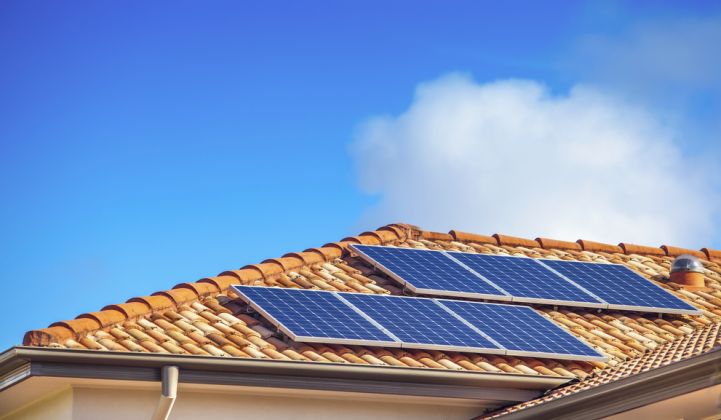Houston-based rooftop solar financier Sunnova has entered the solar-plus-storage market.
The company launched its SunSafe offering in the California market as a 25-year lease deal, with a full warranty and performance guarantee. That gives it a longer product life than other offerings currently on the market.
Customers are free to pay down their contract earlier if they wish, said CEO John Berger. The key value is that Sunnova will maintain the system's operational capabilities for the full 25 years.
"Service is a really big part of who we are," he said. "Why would you only want service or coverage for 15 years or 10 years when you could have it for 25?"
The move comes as the residential storage market has finally started to heat up.
After years with scarcely enough deployments to sustain an industry, residential storage installations broke successive records in each quarter of 2017. Megawatts deployed in homes grew 248 percent year-over-year in 2017, according to GTM Research's Energy Storage Monitor. The segment is speeding into 2018 in full-on hockey-stick growth mode, with the potential to quadruple deployments compared to last year.
The center of this industry is California, where an established solar workforce can tap state policies to promote customer-sited storage, including the Self-Generation Incentive Program rebate. California has also led in developing programs for aggregating distributed storage units for macro-scale grid services.
No. 1 residential solar installer Sunrun reported this month that 20 percent of its solar customers in California now add storage. It has expanded its BrightBox package to Hawaii, Arizona, Nevada, New York and Massachusetts.
Startup Swell Energy also offers an energy security service called EnergyShield that provides solar and storage for as little as $1 per day. The company inked a deal with utility Southern California Edison to outfit 3,000 homes with such systems and provide localized capacity for the grid.
In the increasingly populated home storage ecosystem, Sunnova stands out for the longevity of its products.
The company already has a national profile as the No. 4 third-party-owned solar provider and the No. 5 solar financier, according to GTM's PV Leaderboard. It is unique, though, in offering 25-year loans and leases, longer than the typical 20-year solar lease.
Third-party-owned (TPO) solar has declined in market share, ceding ground to cash and loan deals. That trend follows the decline in system costs and the proliferation of solar loan options that let customers own the system.
Sunrun has managed to buck the trend and keep growing its TPO business. BrightBox lets the company push a higher-value product, while setting up potential grid services revenue down the road.
"Other lease providers are starting to take note and realize that financing storage might be the best way to continue to grow in the TPO space," said Allison Mond, a residential solar analyst at GTM Research. "Additionally, consumer interest in solar-plus-storage is up considerably due to the number of natural disasters that occurred across the country this year."
Indeed, Sunnova saw that damage firsthand while servicing its 10,000 solar customers on Puerto Rico after hurricanes wreaked havoc there last year. That experience added urgency to the development of a backup power device.
"If our customers had had batteries before Irma and Maria, they would have had electricity," Berger said.
The company has now installed roughly 50 systems on Puerto Rico to provide backup power and solar self-consumption, and aims to double that number by the end of the second quarter. Meanwhile, it's taking the product to the mainland, starting with California.
The systems, currently using LG Chem batteries, will focus more on backup and time-of-use rate arbitrage for that market.
Sunnova's entrance resembles Sunrun's strategy in key respects. But whereas Sunrun takes a hybrid approach, working through in-house installers in some markets and partner installers in others, Sunnova keeps itself out of the installation business.
"We have a full commitment to the partner model, not a half commitment," Berger said.
Tesla and Sunrun have gotten a head start in the marketplace, but in a few quarters that market will be unrecognizable from where it was in previous months. And Sunnova is still joining before No. 3 rooftop installer Vivint has made a mark, despite nabbing a partnership with Mercedes-Benz.
Beyond that, there are few national brands supplying the solar, storage and financing in one place.
"We face fewer competitors today than we did a year ago, certainly [fewer] than we did three or four years ago," Berger noted.
When asked if his company would pursue grid services as a way to gain additional revenue from its installed systems, Berger said he'd like to see federal and state regulatory reform to clarify those kinds of opportunities. In the meantime, the company is focusing on providing a higher level of electrical reliability to individual customers.
"Consumers want cleaner, more reliable power at a cheaper price, and solar and storage is able to offer that," he said. "It’s time to leave the 19th-century solution behind us."
By entering the market, Sunnova is contributing not only to the expansion of residential storage, but the growth of third-party financing options, said GTM Research storage analyst Brett Simon.
"Third-party-owned storage will get more popular this year, and will be a good way to bring in customers who were previously on the fence," he said. "It will be like the solar market: It starts off with early adopters who buy for cash, shifts to customers who lease or use a model akin to a PPA, then back to loans or cash sales longer term as prices decline and the market matures."
***
Join us for the 11th annual Solar Summit 2018 in San Diego, May 1-2. Powered by the unique blend of research and economic analysis from the GTM Research team, this year's agenda will feature themes from beyond traditional project finance to innovations in solar and the transformation of electricity.




